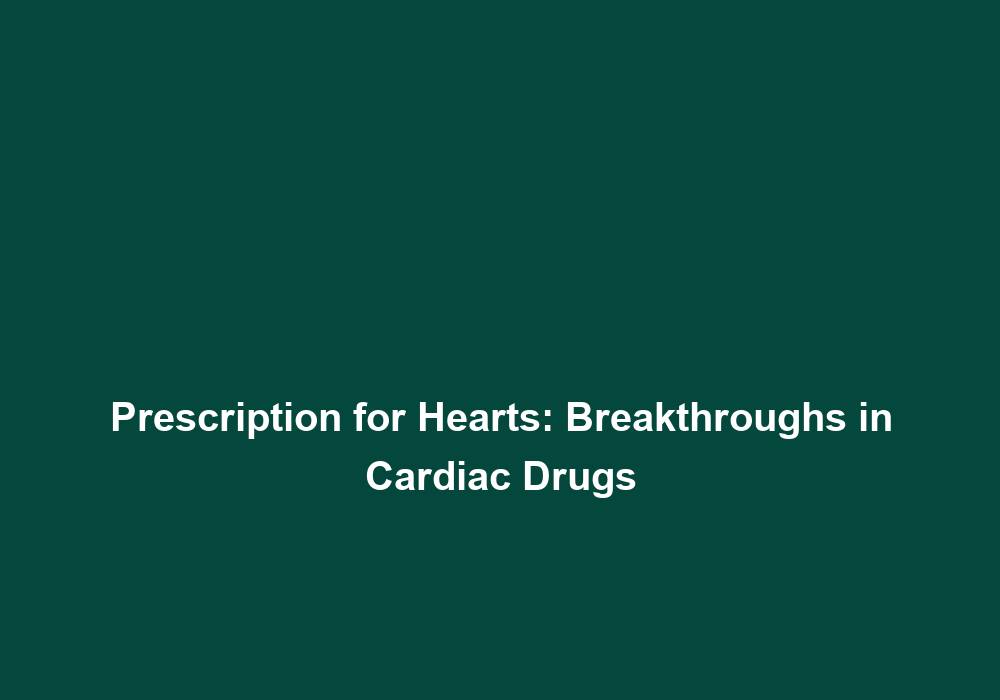Prescription for Hearts: Breakthroughs in Cardiac Drugs
Cardiovascular diseases continue to be a leading cause of illness and death worldwide. These conditions affect the heart and blood vessels, compromising their function and, ultimately, the overall health of individuals. Over the past few decades, there have been remarkable advancements in the field of cardiac drugs, providing new hope for patients suffering from various cardiovascular disorders. This article delves into some of the most significant breakthroughs in cardiac drugs, highlighting their mechanisms of action, benefits, and potential side effects.
1. ACE Inhibitors
Angiotensin-converting enzyme (ACE) inhibitors have revolutionized the treatment of heart conditions such as hypertension, heart failure, and certain types of kidney diseases. These drugs work by inhibiting the production of angiotensin II, a hormone that causes blood vessels to narrow, leading to increased blood pressure. By blocking angiotensin II, ACE inhibitors help relax and widen blood vessels, reducing blood pressure and improving overall cardiac function.
Benefits of ACE inhibitors include:
- Lowering blood pressure: ACE inhibitors effectively reduce blood pressure by relaxing blood vessels, reducing the strain on the heart and minimizing the risk of cardiovascular events. This is particularly beneficial for individuals with hypertension, as it helps prevent complications such as heart attacks and strokes.
- Improving heart failure symptoms: These drugs help alleviate symptoms such as shortness of breath, fatigue, and fluid retention in patients with heart failure. By reducing the workload on the heart, ACE inhibitors improve the overall function of the heart and enhance the quality of life for these individuals.
- Protecting kidneys: ACE inhibitors can slow down the progression of kidney disease in individuals with diabetes or other conditions that affect renal function. By reducing the pressure within the kidneys, these drugs help preserve kidney function and prevent further damage.
Possible side effects of ACE inhibitors may include cough, dizziness, and allergic reactions. It is essential for patients to consult their healthcare providers before initiating ACE inhibitor therapy to ensure proper monitoring and management of potential side effects.
2. Beta-Blockers
Beta-blockers have played a pivotal role in managing various cardiac conditions, particularly in preventing heart attacks and reducing mortality rates in patients with heart failure. These drugs work by blocking the effects of adrenaline and noradrenaline on the heart, thereby slowing down heart rate and decreasing blood pressure. Beta-blockers also help to relax blood vessels, improving blood flow and reducing the workload on the heart.
Key benefits of beta-blockers include:
- Protecting against heart attacks: These drugs help reduce the risk of heart attacks by preventing excessive stimulation of the heart and improving overall cardiac function. By slowing down the heart rate and reducing blood pressure, beta-blockers decrease the oxygen demand of the heart, making it less susceptible to ischemic events.
- Managing heart failure: Beta-blockers improve symptoms, exercise capacity, and quality of life in patients with heart failure. By reducing the workload on the heart and improving its efficiency, these drugs help alleviate symptoms such as shortness of breath and fatigue.
- Controlling arrhythmias: These drugs can help regulate irregular heart rhythms, improving the heart’s overall electrical stability. By blocking the effects of adrenaline and noradrenaline, beta-blockers can prevent tachycardias and other rhythm disturbances, reducing the risk of life-threatening arrhythmias.
Potential side effects of beta-blockers include fatigue, dizziness, and sexual dysfunction. However, these effects vary among individuals, and alternative medications may be suggested by healthcare professionals based on the patient’s specific needs and tolerability.
3. Statins
Statins have proven to be a groundbreaking class of drugs in managing high cholesterol levels, a significant risk factor for cardiovascular diseases. These medications inhibit an enzyme called HMG-CoA reductase, which plays a crucial role in cholesterol synthesis within the body. By reducing cholesterol production, statins effectively lower LDL (bad) cholesterol levels while potentially increasing HDL (good) cholesterol.
Notable benefits of statins are:
- Lowering cholesterol levels: Statins significantly reduce LDL cholesterol levels, decreasing the risk of atherosclerosis and cardiovascular events such as heart attacks and strokes. By inhibiting the production of cholesterol, these drugs help prevent the buildup of plaque in the arteries, promoting better blood flow and reducing the risk of clot formation.
- Stabilizing plaques: These drugs help stabilize plaques within the arteries, reducing the likelihood of plaque rupture and subsequent clot formation. By promoting plaque stability, statins decrease the risk of severe complications such as heart attacks and strokes.
- Anti-inflammatory effects: Statins possess anti-inflammatory properties, contributing to their overall cardiovascular benefits. Inflammation plays a crucial role in the development and progression of atherosclerosis. By reducing inflammation within the arterial walls, statins help maintain the integrity of the blood vessels and prevent the formation of plaques.
Side effects of statins may include muscle pain, liver enzyme abnormalities, and, rarely, a small increased risk of diabetes. However, the benefits of statin therapy generally outweigh the potential risks, especially in individuals with a high cardiovascular risk. Regular monitoring of liver function and muscle symptoms is recommended for patients on statin therapy.
4. Antiplatelet Agents
Antiplatelet agents such as aspirin and clopidogrel have revolutionized the prevention and management of cardiovascular diseases, particularly in individuals at high risk or those who have already experienced a heart attack or stroke. These drugs inhibit platelet aggregation, preventing the formation of blood clots that can occlude blood vessels and lead to severe complications.
Key benefits of antiplatelet agents include:
- Preventing clot formation: By inhibiting platelet aggregation, these drugs significantly reduce the risk of blood clot formation, preventing heart attacks and strokes. Antiplatelet therapy is particularly important for individuals with a history of cardiovascular events or those at high risk due to other factors such as diabetes or smoking.
- Stenting and bypass surgery compatibility: Antiplatelet agents are often used in patients undergoing procedures such as coronary stenting or bypass surgery to minimize the risk of clot formation at these sites. By preventing clot formation, these drugs ensure the success and long-term patency of these interventions.
- Protecting against recurrent events: Antiplatelet therapy helps prevent future cardiovascular events in individuals with a history of heart attacks or strokes. By maintaining platelet inhibition, these drugs reduce the risk of subsequent clot formation and improve overall cardiovascular outcomes.
Potential side effects of antiplatelet agents include an increased risk of bleeding. It is crucial for patients to adhere to recommended dosages and consult their healthcare providers if bleeding complications arise. Close monitoring of platelet function and regular follow-up visits are necessary to ensure the optimal balance between the prevention of clot formation and the risk of bleeding.
Conclusion
Advancements in cardiac drugs have transformed the landscape of cardiovascular disease management, providing patients with improved outcomes and a better quality of life. ACE inhibitors, beta-blockers, statins, and antiplatelet agents are just a few examples of the significant breakthroughs that have revolutionized the treatment and prevention of heart conditions. However, it is essential to remember that every patient is unique, and individualized treatment plans should be tailored by healthcare professionals based on the specific needs and medical history of each patient. These advancements in cardiac drugs have brought us closer to effectively combating cardiovascular diseases and improving the overall well-being of patients.







